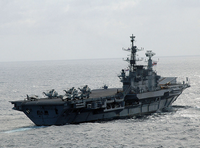The plight of the Indian freighter MV Asphalt Venture has added a new dimension to India's fight against piracy in the Indian Ocean. In a first, a spokesperson for pirates based in Harardhere, Somalia, announced last week that they had reached a "consensus" decision to retain seven Indian sailors as hostages -- even though the pirates had released the ship itself after receiving the full ransom from its Mumbai-based owners. The move is an attempt to achieve the release of about 120 Somali pirates currently held in Indian prisons following a series of Indian naval actions in the Indian Ocean over the past few months.
That the pirates hope to negotiate a prisoner exchange suggests new levels of both confidence and organization. Unfortunately this new assertiveness could well be the result of encouragement from al-Qaida affiliate al-Shabaab, which currently controls half of Somalia. That raises the specter of Somalia becoming a terrorist state financed by pirate revenues, with severe consequences for Indian Ocean security. India can no longer afford a purely defensive strategy on the high seas, but must now look seriously at both economic and political intervention in the Horn of Africa.
Most of the debate in India and elsewhere is currently focused on the need to codify a law to deal specifically with piracy; India is currently trying the Somali pirates under the standard Indian penal code. There is also some discussion of whether the Indian government should gradually expand the rules of engagement in the fight against piracy.

